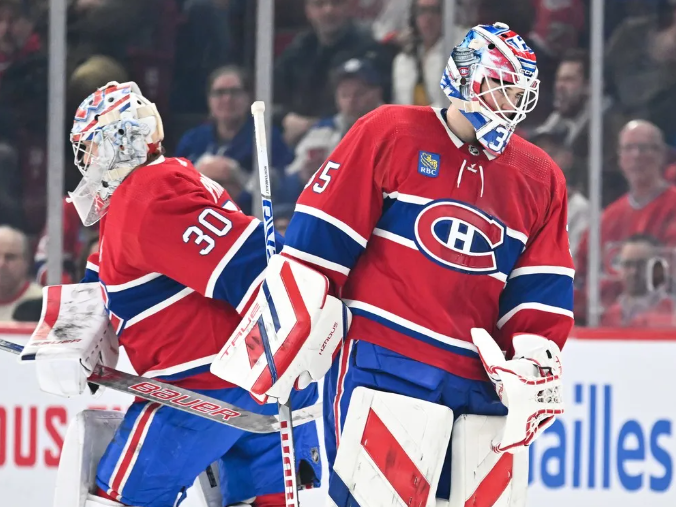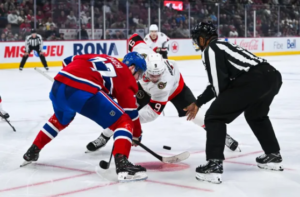
Canadiens Recruit Retired Center to Solve Critical Problem

The Montreal Canadiens are in a challenging position early in the 2024-25 NHL season. After missing the postseason for the last three years, the team finds itself struggling once again, currently sitting at a disappointing 4-7-1 record. This places them in a tie for last place in the Atlantic Division with the Buffalo Sabres, raising concerns about their playoff viability. One glaring issue contributing to their difficulties is their performance in the faceoff circle, a crucial aspect of gaining puck possession and controlling the game.
As it stands, the Canadiens have only managed to win 47.6 percent of their faceoffs this season, ranking them 25th in the league. This statistic is particularly alarming because winning faceoffs is fundamental to establishing offensive pressure and transitioning smoothly between defense and offense. With the team’s current trajectory, addressing this problem has become an urgent priority for the coaching staff.
In an effort to remedy this issue, the Canadiens made a notable decision by inviting former NHL player Marc Bureau to their practice. Bureau, who played 11 seasons in the league—including three with the Canadiens from 1995 to 1998—has a reputation as a faceoff specialist. While he may not have had his faceoff statistics tracked during much of his career, he is widely recognized for his ability to win draws. During his final season with Montreal, Bureau recorded a 51.4 percent success rate in faceoffs, a number that improved in subsequent seasons with the Philadelphia Flyers, where he achieved faceoff percentages of 53.4 and 56.3.
The importance of faceoffs cannot be overstated. Each draw is a battle for puck possession, and teams that excel in this area often gain a significant advantage in controlling the pace and flow of the game. Unfortunately for the Canadiens, they currently lack any centers who have taken at least 20 draws and maintained a faceoff percentage above 50 percent. Kirby Dach and Alex Newhook have particularly struggled, winning only 41.0 percent and 40.8 percent of their faceoffs, respectively. This lack of success in the faceoff circle translates directly to their inability to maintain offensive pressure and establish a rhythm on the ice.
Bureau’s presence at practice represents a proactive step by the Canadiens coaching staff. The hope is that his experience and insights will help Montreal’s centers refine their techniques and strategies for winning faceoffs. If even one or two players can significantly improve their faceoff success, the ripple effect could be profound. Better faceoff performance would likely lead to more puck possession, which in turn could result in increased scoring opportunities and, ideally, more wins.
While it may be over 20 years since Bureau last played in the NHL, his knowledge and experience remain relevant. Faceoff techniques can be nuanced, and learning from someone who excelled in that area can provide valuable lessons for the current roster. The Canadiens’ coaching staff likely recognizes that small improvements in faceoff performance can contribute to larger successes on the ice.
The timing of this initiative is crucial as well. The Canadiens are set to face the Calgary Flames next, a team that currently ranks among the worst in the league for faceoff success. This matchup presents an opportunity for the Canadiens to apply what they’ve learned from Bureau in a competitive environment. If the centers can translate their practice into effective faceoff wins during the game, it could provide a significant boost to the team’s overall performance.
In recent years, the Canadiens have struggled not just with faceoffs but with their overall offensive production. The inability to secure puck possession often leads to extended defensive zones, putting immense pressure on the team’s goaltending and defensive units. When a team can’t control the puck, they can’t control the game, which leads to frustration among players and fans alike. Addressing the faceoff problem could potentially change this narrative, allowing the Canadiens to play a more aggressive and confident style of hockey.
In addition to the immediate benefits of improved faceoff performance, the long-term effects could also be significant. If players can establish a reputation for winning draws, it can shift the dynamics of future matchups. Opponents may begin to strategize differently when facing the Canadiens, perhaps overextending themselves in other areas of the game to compensate for their struggles in the faceoff circle.
Moreover, the experience of working with a former player like Bureau can serve to motivate the younger players on the Canadiens’ roster. Many of these players grew up watching legends of the game, and having a figure from that era involved in their development can inspire them to elevate their performance. It underscores the team’s commitment to improvement and development, which is crucial for a franchise looking to rebuild and return to playoff contention.
As the Canadiens prepare for their upcoming games, the influence of Bureau and the focus on faceoffs will be key areas to watch. A successful outing against the Flames could signify the start of a turning point for the team. Conversely, continued struggles could further exacerbate the challenges they face as they attempt to navigate a competitive Atlantic Division.
Montreal Canadiens are at a pivotal moment in their season. With their recent struggles and a pressing need to improve their faceoff success, the decision to bring in Marc Bureau reflects a strategic effort to address a critical weakness. By leveraging Bureau’s expertise and insights, the coaching staff hopes to foster improvement among the centers, which could lead to greater puck possession and scoring opportunities. As they gear up to face the Calgary Flames, all eyes will be on the Canadiens to see if they can turn their fortunes around and make a concerted push toward climbing out of the bottom of the Atlantic Division. The time for action is now, and the Canadiens are poised to take steps to secure their future success.

Leave a Reply